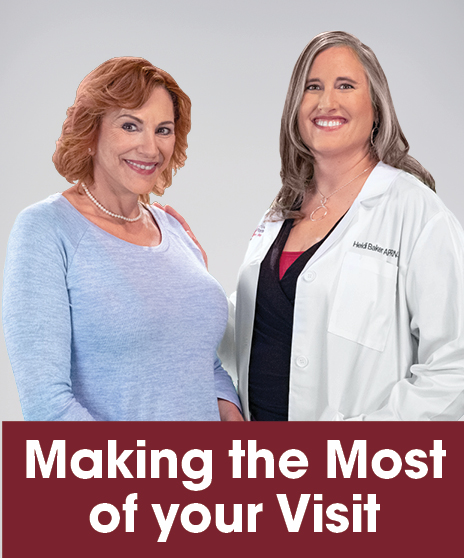Whether you’re seeing your provider for the first time, for a regular checkup, or for an acute medical reason, you’ll want to be prepared to provide some information to help make the visit as efficient as possible. A visit to your provider can feel overwhelming, especially when there’s a lot of information to be exchanged and share in a small, allocated amount of time. Every minute of the appointment counts, and to get the attention and care you need, some of the following can help you be more prepared for your visit.
Three Easy Steps to Plan for Your Visit
Information: Gather what you will need before your appointment. This may include insurance cards, records, address or directions to the medical clinic.
Prioritize: Deciding ahead of time what you most want to get out of the visit will help you organize your thoughts and shape how you and your provider spend the time together.
Goals: Setting realistic goals and expectations beforehand will help you leave satisfied.
Ten Top Tips to Help Achieve an Efficient Visit:
Create a medical folder and note book: In this folder and note book, list or have records of your medical and surgical history along with family history. If you have any chronic health conditions, or if you have a new symptom you’re concerned about, you should be documenting your symptoms and how they progress throughout the days or weeks. For example: What kind of home remedies have you tried? What aggravated or alleviated the symptoms? Be specific about your symptoms.
Update your provider: Let him or her know what has happened in your life since your last visit. For example: If you have been treated in the emergency room or by a specialist, tell the provider about any recent changes in any medications you take or the effects they have had on you.
Interpreter: Request an interpreter if you need one. It is vital that you have a good understanding of what was discussed during your office visit.
Health insurance: Having the basic understanding of your health insurance coverage will help with referrals or any new orders your provider may recommend during the office visit.
Questions/concerns to ask: Brainstorm a list well before your appointment, and have concise questions, starting the most urgent questions that you must get answered.
Medications: Create a list of all your medications, including supplements or over the counter and any allergies you may have. Always bring all of your medications, either the bottles or a list, including your over the counter medications to all of your medical care appointments. Tell your provider if you stop taking any medications and be honest if you have not been taking the medications as prescribed.
Support: Having someone with you will give you better support during the appointment. They can help remind you of your questions and concerns and is another measure to help ensure your provider answers all the questions that you have. They can also help remind you of the recommendations that were given during the office visit.
Honesty: This is critical to a successful visit. Holding back embarrassing information or shading the truth could jeopardize your health. If you are not satisfied, speak up. If you are not taking your medications be honest. If you have any barriers to getting the care you need, ask for resources or recommendations.
Personal impairment: Having visual or hearing impairment can hinder the care you want. Have the appropriate things you need with you to help you engage in your health better. If you need your glasses, please have them with you so you can read or see better. If you are hard of hearing, remember to wear your hearing aid.
Engagement: Be engaged.You know better than anyone else how you feel, and that information is vital to your provider. This is your health, and you should take part in the decision making. The visit isn’t over until you know exactly what you’re supposed to do and when you need to return. Always remember that a medical appointment isn’t a one-time event, it’s an ongoing relationship. You should leave your provider’s office feeling like your concerns were heard and acknowledged. Together you and your provider should come up with a health care plan that feels like the right fit for your needs.


